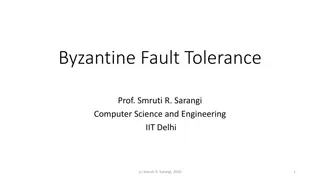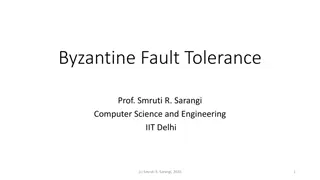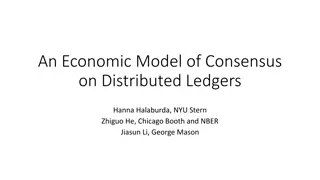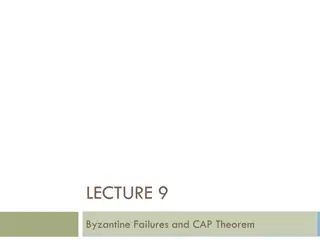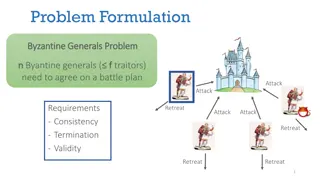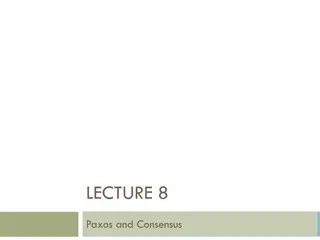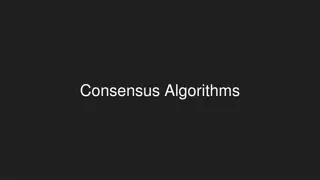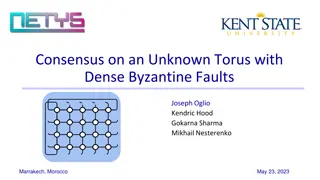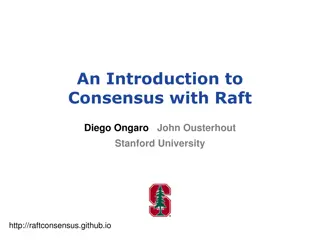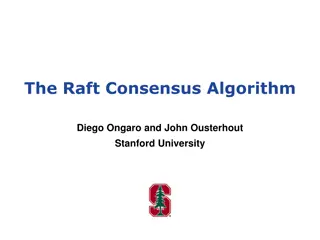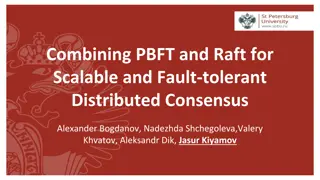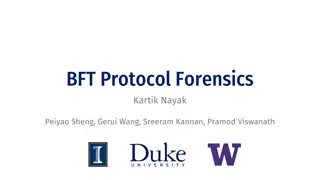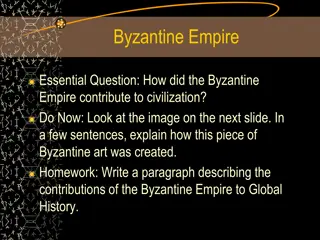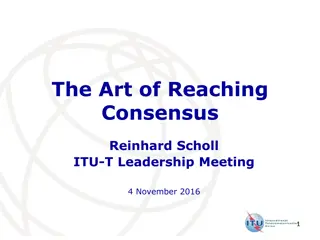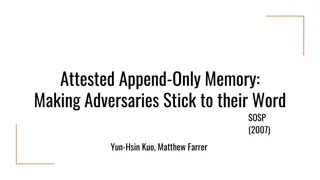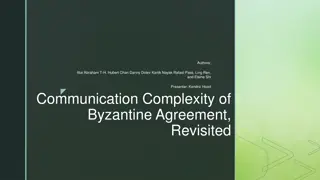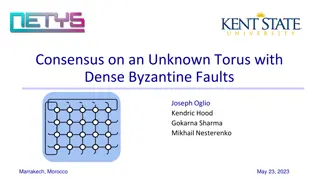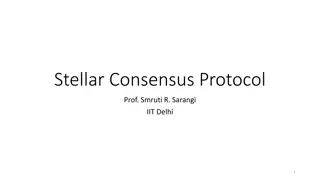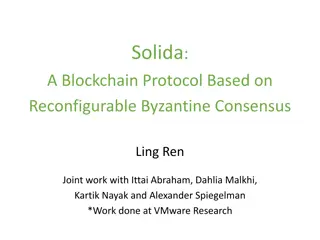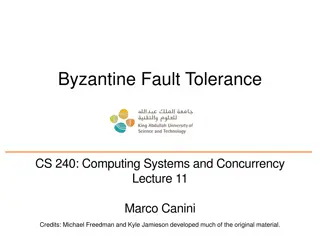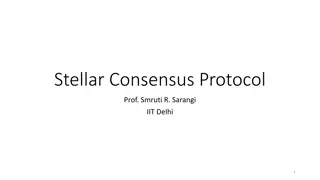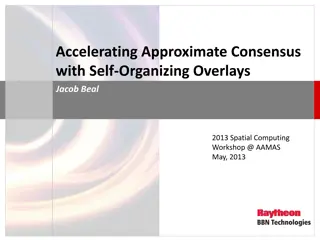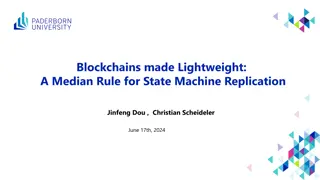Overview of Distributed Systems: Characteristics, Classification, Computation, Communication, and Fault Models
Characterizing Distributed Systems: Multiple autonomous computers with CPUs, memory, storage, and I/O paths, interconnected geographically, shared state, global invariants. Classifying Distributed Systems: Based on synchrony, communication medium, fault models like crash and Byzantine failures. Comp
11 views • 126 slides
Byzantine Fault Tolerance in Distributed Systems
Byzantine fault tolerance is crucial in ensuring the reliability of distributed systems, especially in the presence of malicious nodes. This concept deals with normal faults, crash faults, and the challenging Byzantine faults, where nodes can exhibit deceptive behaviors. The Byzantine Generals Probl
0 views • 29 slides
Byzantine Fault Tolerance: A Comprehensive Overview
Byzantine Fault Tolerance (BFT) is a critical concept in computer science, addressing faults in distributed systems. This summary covers the types of faults (normal, crash, Byzantine), implications of Byzantine faults, Byzantine Generals Problem, impossibility results, and the complexity of solving
3 views • 29 slides
Round-Efficient Byzantine Broadcast Under Strongly Adaptive and Majority Corruptions
This paper discusses a round-efficient Byzantine broadcast protocol that addresses strong adaptive adversaries and majority corruptions. The protocol involves unique and unbreakable peer signatures, committees for message verification, and time-locking mechanisms to prevent message tampering. By uti
3 views • 5 slides
Economic Models of Consensus on Distributed Ledgers in Blockchain Technology
This study delves into Byzantine Fault Tolerance (BFT) protocols in the realm of distributed ledgers, exploring the complexities of achieving consensus in trusted adversarial environments. The research examines the classic problem in computer science where distributed nodes communicate to reach agre
1 views • 34 slides
Byzantine Failures and CAP Theorem Overview
Byzantine failures refer to arbitrary patterns of failures where nodes exhibit inconsistent behavior. This lecture discusses Byzantine agreement and the challenges in reaching consensus with faulty nodes. It explores the minimum number of processes needed for consensus and extends the concepts to ge
1 views • 32 slides
Distributed Consensus Models in Blockchain Networks
Economic and technical aspects of Byzantine Fault Tolerance (BFT) protocols for achieving consensus in distributed ledger systems are explored. The discussion delves into the challenges of maintaining trust in adversarial environments and the strategies employed by non-Byzantine nodes to mitigate un
0 views • 34 slides
Geometric Routing Concepts and Byzantine Fault Tolerance
Geometric Routing enables routing without overhead, where each node knows its global coordinates and forwards messages based on proximity to the destination. Byzantine Faults pose challenges with arbitrary node behavior, but a Byzantine-Robust Geometric Routing algorithm addresses this in a 3-connec
3 views • 33 slides
Exact Byzantine Consensus on Undirected Graphs: Local Broadcast Model
This research focuses on achieving exact Byzantine consensus on undirected graphs under the local broadcast model, where communication is synchronous with known underlying graphs. The model reduces the power of Byzantine nodes and imposes connectivity requirements. The algorithm involves flooding va
0 views • 7 slides
Byzantine Generals Problem in Distributed Systems
The Byzantine Generals Problem addresses how a group of generals, some of whom may be traitors, can reach a consensus on a battle plan while ensuring consistency, termination, and validity. Various protocols are explored to handle challenges such as faulty leaders, consistency violations, and cheati
0 views • 23 slides
Paxos and Consensus in Distributed Systems
This lecture covers the concept of Paxos and achieving consensus in distributed systems. It discusses the availability of P/B-based RSM, RSM via consensus, the context for today's lecture, and desirable properties of solutions. The analogy of the US Senate passing laws is used to explain the need fo
1 views • 46 slides
Consensus Algorithms in Paxos
Consensus algorithms play a vital role in distributed systems like Paxos. Paxos is a protocol that aims to achieve consensus among a majority of participants. It defines roles for nodes like proposers, acceptors, and learners, each serving a specific purpose in reaching agreement on a single value.
0 views • 24 slides
Byzantine Faults and Consensus on Unknown Torus
The discussion revolves around achieving consensus in the presence of dense Byzantine faults on an unknown torus. Various challenges and impossibility theorems are explored, highlighting the complexities of reaching an agreement in such fault-prone environments. The content delves into the limitatio
0 views • 23 slides
An Introduction to Consensus with Raft: Overview and Importance
This document provides an insightful introduction to consensus with the Raft algorithm, explaining its key concepts, including distributed system availability versus consistency, the importance of eliminating single points of failure, the need for consensus in building consistent storage systems, an
0 views • 20 slides
The Raft Consensus Algorithm: Simplifying Distributed Consensus
Consensus in distributed systems involves getting multiple servers to agree on a state. The Raft Consensus Algorithm, designed by Diego Ongaro and John Ousterhout from Stanford University, aims to make achieving consensus easier compared to other algorithms like Paxos. Raft utilizes a leader-based a
0 views • 26 slides
Enhancing Distributed Consensus: Combining PBFT and Raft for Improved Security
Addressing challenges in distributed systems, this study proposes a novel approach by combining PBFT and Raft consensus mechanisms to enhance scalability and fault tolerance. The research highlights the importance of secure data storage and identifies new attack mechanisms in today's digital landsca
0 views • 11 slides
Comparison of Economic Reform Sequencing in China
Andrew K. Rose from NUS Business School compares China's economic reform sequencing with the Washington Consensus. The optimal reform sequencing includes stabilization before reform, real before financial reform, and domestic before international reform. China's approach aligns oddly with the Washin
1 views • 14 slides
Byzantine Fault Tolerance: Protocols, Forensics, and Research
Explore the realm of Byzantine fault tolerance through protocols like State Machine Replication and HotStuff, discussing safety, liveness, forensic support, and the impact of Byzantine faults. Dive into decades of research on achieving fault tolerance and examining forensic support in the face of By
1 views • 24 slides
The Contributions of the Byzantine Empire to Civilization
The Byzantine Empire made significant contributions to civilization through art, law, religion, and centralization of government. The empire's legacy includes the preservation of Roman laws, promotion of Christianity, accumulation of church wealth, and establishment of Constantinople as a key center
0 views • 22 slides
The Art of Reaching Consensus - Reinhard Scholl ITU-T Leadership Meeting
Explore the nuances of consensus-building, leadership roles, and decision-making processes. Gain insights into defining consensus, understanding opposition, and the chairman's pivotal judgment role. Learn tips on crafting consensus effectively and making crucial inquiries. Delve into the significanc
1 views • 36 slides
Secure Append-Only Memory for Byzantine Fault Tolerance
Explore the concept of Attested Append-Only Memory (A2M) in distributed systems, which ensures adversaries adhere to their commitments. Learn about safety and liveness goals, Practical Byzantine Fault Tolerance (PBFT), equivocation issues, and the A2M log and interface for secure data management. Di
0 views • 34 slides
Communication Complexity in Byzantine Agreement Research
The presentation discusses communication complexity in Byzantine Agreement, emphasizing a lower bound of (f/2) when After the Fact removal is considered. It explores two major contributions - the communication lower bound in randomized protocols and near-optimal subquadratic Byzantine Agreement. The
0 views • 9 slides
Consensus and Fault Tolerance on an Unknown Torus with Dense Byzantine Faults
This content discusses achieving consensus and fault tolerance on an unknown torus with dense Byzantine faults, exploring scenarios of sparse and dense faults in a network setting. It delves into the challenges of consensus algorithms on toroidal networks, highlighting the limits and complexities th
0 views • 23 slides
RapidChain
RapidChain is a protocol designed to enhance scalability and security through adaptive Byzantine tolerance. It employs committees to verify transactions and maintain consensus, with a focus on preventing corruption and enabling cross-shard transactions. The protocol goes through phases like Bootstra
0 views • 15 slides
Stellar Consensus Protocol
Explore the concepts of permissioned and permissionless blockchains, quorum slices, and the Federated Byzantine Quorum System in Stellar and Ripple. Delve into fault models, assumptions, and practical examples of quorums and quorum slices in distributed consensus protocols.
0 views • 32 slides
Byzantine Generals in the Permissionless Setting
The challenges and solutions faced by Byzantine generals in the permissionless setting, including concepts like Byzantine Broadcast, decentralized protocols, and defense against mobile adversaries. Delve into the theorems and definitions that shape this fascinating field of study.
0 views • 17 slides
Understanding the Raft Consensus Algorithm
Raft Consensus Algorithm, developed by Diego Ongaro and John Ousterhout at Stanford University, ensures agreement on shared state and autonomous recovery from server failures. It focuses on eliminating single points of failure and building consistent storage systems using replicated state machines.
0 views • 16 slides
Blockchain Protocol Solida: Reconfigurable Byzantine Consensus
Solida is a blockchain protocol based on reconfigurable Byzantine consensus, developed by Ling Ren in collaboration with Ittai Abraham, Dahlia Malkhi, Kartik Nayak, and Alexander Spiegelman at VMware Research. The protocol provides insights into Bitcoin, mining, double spending, permissionless conse
0 views • 19 slides
An Overview of Byzantine Fault Tolerant Consensus
In this overview, explore the fundamental problem of consensus in distributed computing, covering safety, liveness, fault types, research advancements over 40 years, well-known results, and the Sync HotStuff protocol. Delve into the complexities and models of achieving fault-tolerant consensus in va
0 views • 22 slides
An Overview of Byzantine Fault Tolerant Consensus
In this overview, delve into the fundamental problem of consensus in distributed computing, exploring safety and liveness aspects. Discover the various facets of consensus, key research findings, and well-known results in fault tolerance. Uncover insights into Sync HotStuff protocol and its practica
0 views • 27 slides
Solida: A Blockchain Protocol Based on Reconfigurable Byzantine Consensus
Dive into the innovative blockchain protocol Solida, developed through collaborative research at VMware. Explore the intricacies of blockchain technology with a focus on reconfigurable Byzantine consensus, incorporating concepts like mining, double spending, and permissionless consensus. Uncover the
0 views • 14 slides
Achieving Total Order in State Machine Replication and Consensus Protocols
Exploring the concepts of state machine replication and consensus protocols such as BFT (Byzantine Fault Tolerance) in the context of blockchain technology. The content delves into the importance of total order requirement in maintaining consistency and reliability in distributed systems.
0 views • 28 slides
Understanding Blockchains and Consensus Mechanisms
Explore the fundamentals of blockchains, client-server architecture, state machine replication, and the challenges of achieving total order in blockchain consensus. Learn about tolerating Byzantine failures, ensuring integrity and safety, and maintaining availability in blockchain systems.
0 views • 43 slides
Understanding Fault Tolerant Consensus for Reliable Systems
Explore the concept of fault-tolerant consensus in computer systems, covering topics such as Byzantine fault tolerance, replication strategies, consensus types, and fault tolerance bounds. Learn about key protocols like PBFT and motivations behind fault tolerance in system design.
0 views • 20 slides
7th Century Historical Overview: Rise of Islam and Byzantine-Persian War
Explore the historical landscape of the 7th century, witnessing the rise of Islam amidst Western and Eastern opposition. Dive into the desolate state of Rome, the political dynamics between the Byzantine Empire and the Arab world, and the consequences of the Persian-Byzantine War. Uncover the comple
1 views • 24 slides
Byzantine Fault Tolerance & State Machine Replication Overview
Learn about Byzantine fault tolerance in computing systems, the challenges of tolerating arbitrary failures, and the importance of providing state machine replication for reliable services. Explore practical algorithms and case studies for mitigating Byzantine faults in critical systems.
0 views • 41 slides
Understanding Failure Detectors and Consensus Algorithms
Delve into the intricacies of failure detection, the challenges with unreliable detectors, and the impossibility of achieving consensus in asynchronous systems. Explore key concepts like RFDs, FLP impossibility result, and the role of failure detectors in solving consensus. Optional reading on diffe
0 views • 5 slides
Understanding Stellar Consensus Protocol and Byzantine Fault Tolerance
Learn about the various types of blockchains, notion of quorums, and new ideas in Stellar and Ripple protocols. Explore the background, assumptions, and key ideas behind quorum slices in consensus algorithms.
0 views • 32 slides
Accelerating Approximate Consensus with Self-Organizing Overlays
Explore how self-organizing overlays can accelerate approximate consensus in spatial computing applications like flocking, swarming, and sensor fusion. Learn about the PLD-Consensus approach and how it addresses the slow convergence issue of Laplacian consensus. Discover the innovative methods to sh
0 views • 14 slides
Lightweight Approach for State Machine Replication with Median Rule
Explore a lightweight approach for state machine replication utilizing a median rule concept. Understand the motivation behind permissionless proof of work, delegated proof of stake, and BFT consensus protocols. Dive into leaderless BFT consensus protocols, asynchronous message passing, and the goal
0 views • 21 slides

